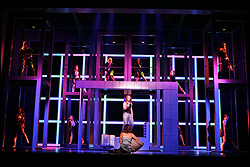If you’re a 12-year-old girl, stop reading this and go tell your parents that if they’ve got $18 to $70 to toss around you should all head downtown for the 5th Avenue’s latest attempt at Hairspray-hefty success. If you’re not a 12-year-old girl, or the parent of one, and you still want to see Princesses—what’s your problem?
Princesses (ends Sun., Aug. 28; the 5th Avenue Theatre, 206-292-ARTS), in which mouthy private-school teenage girls are forced to participate in a musical version of Frances Hodgson Burnett’s The Little Princess, is pat, sitcom-predictable, and so tightly canned by lyricist/director David Zippel that even its best moments don’t have the oomph of spontaneous musical theater excitement. The show hasn’t been created so much as engineered, though, like many works of engineering, it has big, shiny, individual parts that sometimes work together to make sure the machine they support does what it’s supposed to do.
In any case, this machine has been engineered to look and sound like a big-budget Broadway musical that resembles what adolescent girls imagine the lives of high-school girls to be—without, that is, forgetting the particular sensibilities of adolescent girls. This means, for instance, the angry repetition of the word “friggin’.” It also means that heroine Miranda (Jenny Fellner)—whose widowed, itinerant movie-star father Kevin Finch (Brent Barrett) decides to direct the school musical as a bid to regain her affections—ends up in a climactic clinch with her newly devoted dad to the strains of a song called “I Will Never Leave You.” The evening is such a blatant commodification of tweenie desires that it’s a wonder it doesn’t include a pony and a visit from Harry Potter.
Act II finds Miranda receiving a surprise visit from Zachary Tanner (played by—get this—a former Abercrombie & Fitch model named Storm Newton). Zach is the new hunk on the block and Mr. Finch’s main competition in Tinseltown (and, based on the Freudian angst at work here, in the romance department, too). The temptingly chiseled young star shows up to provide a muscled threat to Miranda’s virginity via an ersatz up-tempo Backstreet Boys serenade titled “Just Say Yes,” which also features Miranda’s classmates in their schoolgirl garb gyrating Britney Spears–style under red lights. But, parents, have no fear. Miranda becomes the first girl in history to turn down sex with a movie star in Paris because she’s got a high-school musical to do.
Zippel (City of Angels) and book writers Cheri and Bill Steinkellner (whose credits include Emmys for TV’s Cheers) have packed the show with so many glib, “hip” references—everything from pop singer Pink to Cajun fries—that you can’t help but picture Broadway enthusiasts in 2050 stumbling across a dusty original-cast CD and thinking, “Huh?” Matthew Wilder, a pop composer who had some success with Disney’s Mulan, has concocted a bouncy, occasionally pseudo-rock score (i.e., every now and then, the rebellious teens have to howl to match the keyboards and electric guitar) with a fresh-faced sameness that sounds better suited to a Disney cartoon, which is fine, because that’s exactly what this is.
It’s too bad, in fact, that these engineers didn’t go pure Disney (as opposed to fiscal Disney) and create something that this production suggests they could have succeeded with—a strict musical adaptation of The Little Princess. All of the songs for the show within a show, particularly a sweet weeper called “By Heart,” have winsome charm. And Princesses‘ adult performers both come off far better at their dual chores in the school show: Barrett’s manly trill is too affected, too Broadway, to pass him off as a Hollywood hottie, but as the Captain of the Burnett novel, he’s right on the money; Donna English is blah in her comic relief role as the school’s music instructor, but comes alive as the mean Miss Minchin of Princess.
Yet the girls pull through. Fellner is suitably jaded and yearning, and her voice holds its own against the myriad vocal styles that Wilder throws at her. Though Newton seems just shipped in from a gym workout, which would explain his stiffness onstage, the rest of Fellner’s friends are admirably flexible. Lindsay Mendez, Sierra Boggess, and Anne Letscher crack home the evening’s sole showstopper, “What a Drag,” a snappy trio in front of a dressing-room mirror in which they lament the injustices of an awkwardly developed body.
At such moments, you have to recognize that the production will have no problems delighting its intended market. Even if Rob Ashford’s choreography is more MTV than Great White Way, and Douglas W. Schmidt’s scenery is an overblown blend of Hollywood Squares and Dreamgirls (look, Ma, we built a big set!), every moment in the show is so sharply executed that you could poke your eyes out on it. Fun is fun, remember, until someone loses an eye.








